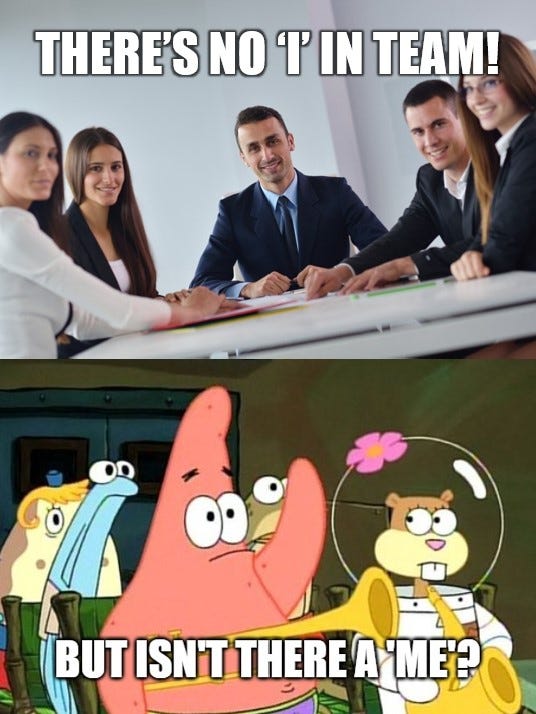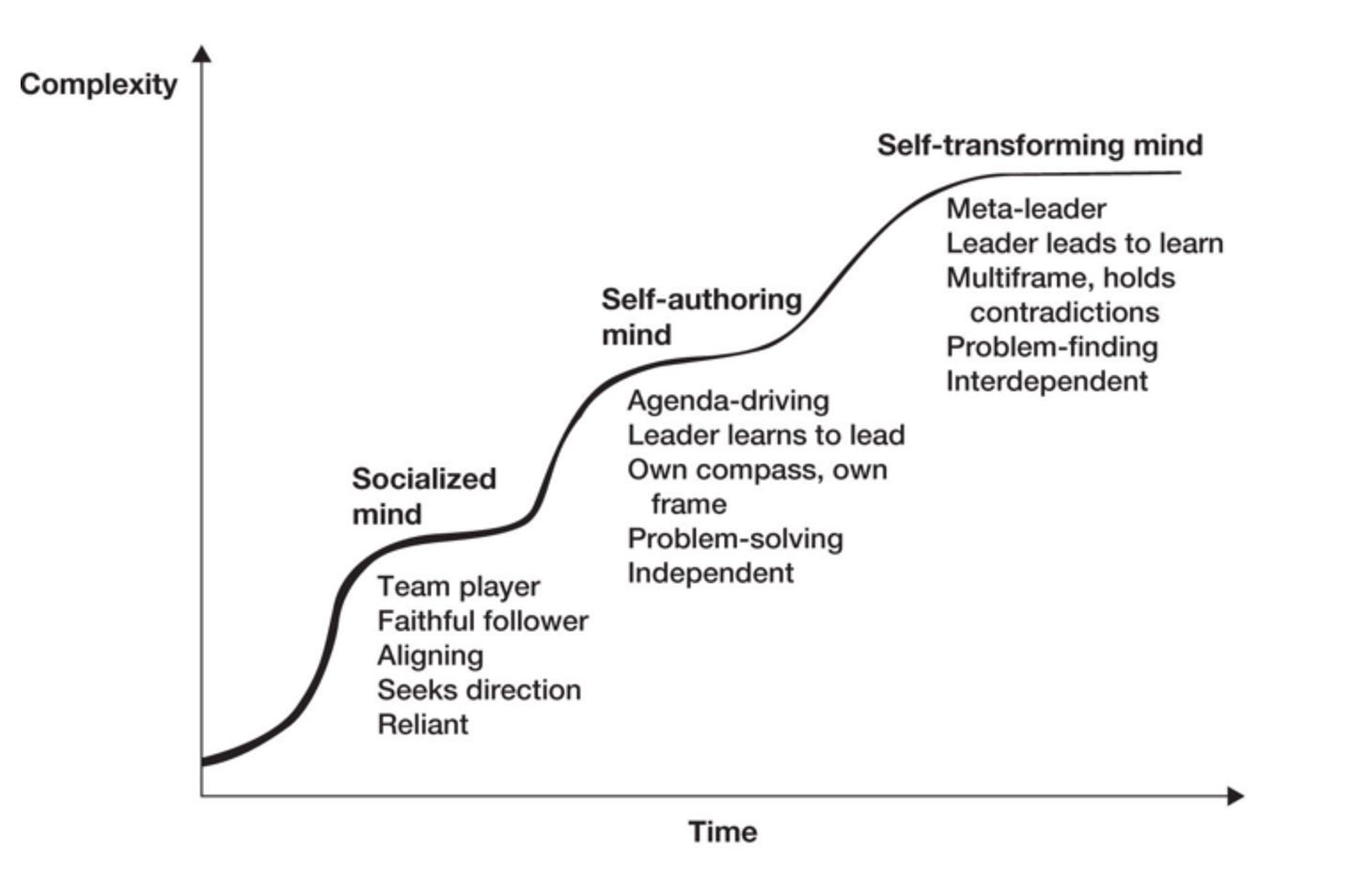A few weeks back, I shared an observation on the over-use of: “Now more than ever…” as a sweeping call to action intended to agitate for change. Now, I want to swing the spotlight to another, even more subtle phrase:
We need better leaders!
We need to work better as a team!
We need better governments!
We need to take action on climate change!
Right then… who’s this 'we'?
The flattening effect of ‘we’
Over time, I’ve started to feel uncomfortable with this sweeping pronoun. In conferences, in workshops, in meetings, I’ve come to sense that: "What are we going to do about this?" really meant: "What is someone else going to do about this?" Conversations where: “How might we better support each other?” was code for: “Scott, what are you going to do for me?”
Look, I’m not arguing for the abolishment of the word ‘we’; that would be linguistically insane. In general parlance (as per the examples above), ‘we’ is used to refer to a collective group. In my writing, I’ll use ‘we’ to refer to the connection between you (the reader) and myself. Within the context of leadership and team dynamics, the use of 'we' is frequently recommended to recognise the collective efforts of everyone involved: ‘We work as a team’, ‘we face challenges together’, etc.
However, on the dark side of this coin, I’ve seen how ‘we’ can be used as a performative shield to mask individual accountability and responsibility; where the use of ‘we’ has diminished the importance of ‘me’. In other words, ‘we’ can flatten our individuality.
You might be wondering why I’m locking in on this bit of pedantic nuance. Well, let’s talk about adult development.
How we make sense of the world
For those unfamiliar with the concept of ‘adult development’, it essentially refers to the biological and psychological changes that we all experience, typically from adolescence onwards. In psychology, it is a relatively new field of study, as it was previously assumed that ‘development’ stops once adolescence ends. Putting it far more plainly, the assumption was: “You can’t teach an old dog new tricks.”
There are several frameworks out there but the one I want to reference today is Robert Kegan’s theory of ‘meaning-making’, which is the process of how people well… make sense of the world. The important part of Kegan’s framework to understand is that over time, our ability to make sense of complexity increases. However, it’s not a linear trajectory; people can (and do) plateau.
Now, that framework above was written with leadership development in mind but you can pretty much replace ‘leader’ with ‘adult’ and it still tracks. If I had to use simpler language to describe each stage, it would be:
The Socialised Mind: We (i.e. our identity) are shaped by our personal environment, the people we hang out with, and their expectations.
“I’m happy to go along with what everyone’s saying, to be one with the group.”
The Self-Authoring Mind: We’re able to take a step back from all that and learn how to distinguish between the expectations of others vs what we really think.
“I recognise that I’m being presented with other people’s ideas, not all of which I agree with.”
The Self-Transforming Mind: We can reflect on and challenge our own ideologies, beliefs, and expectations. We realise that contradictions and paradoxes in our lives can co-exist with each other.
“I wonder if I’m wrong? Or perhaps there are multiple interpretations that I’m not seeing?”
Right, that’s about as deep as I’ll go on the framework itself in this article (if you’d like to learn more, drop a comment).
The reason I wanted to reference this framework is because of those plateaus. I argue that the haphazard use of ‘we’ might actually be holding people back at the very first stage.
From ‘me’ to ‘we’
In my teenage years, it was all about me. I was special. I was smart. I knew everything, because what teenager doesn’t know everything about the world. I formed opinions on everything from religion to politics to relationships. I was the bee’s knees.
And then I joined the workforce. I got into one of the Big 4s and very quickly became ensconced in the world of ‘we’. We work as a team. We’re in it together. We’re all passionate about improving the operational efficiency of supply and demand forecasting for major retailers—wait what?
Here’s my dirty secret: For the first few years of my career, I had no idea what I was doing. I was punching data into a system without really understanding why. I was documenting operational processes based on an intellectual understanding of the work I needed to do, but not because I knew what problems I was actually fixing.
For context, at the time, there was enormous staff turnover. The workload was beyond excessive; one poor guy even died at work from a heart attack. This is the flattening effect of ‘we-ness’. We continued to work.
One day, I had a meeting with a Partner, who said: “You know… we kinda know that this is a meat grinder. We bring a bunch of young people in like yourselves, churn through you, and you do get spat out the other end.”
I quit after that. If I didn’t have that meeting, I might still be a ‘we’. To this day, I wonder if that Partner was playing a game of 4D chess with me, subtly suggesting that I should try to get out whilst I still can. Irrespective, he helped me break through a plateau.
The ‘me’ in team
Over time, I started to recognise more and more who this ‘me’ was. It wasn’t big at first but I began to establish myself within the ‘we’. I had ideas that I wanted to contribute, initiatives that I wanted to lead on. I still recognised and respected the ‘we’ (gotta get paid, after all), but the thing that had changed was the emergence of ‘me’ in the middle of it all.
Yes, I would still use ‘we’ to refer to the collective but it was always closely followed by an ‘I’. For example: “Our project planning tools are getting a bit outdated and we need to overhaul it. What I’m going to do is share with you a couple of my ideas and suggestions.”
I started to realise the impact that I could have, and that I might be more useful to everyone else by actually taking ownership of what I do.
To get a bit cute about it, ‘we’ became ‘WiE’.
This emergence also started to have an impact beyond the workplace. Where I used to jump on the: “We need to act on climate change!” bandwagon, I started to think: “Hold up… what have I actually done? What else can I do? What don’t I know?”
An evolution of ‘I’
Where I’m from (Australia), there’s a thing called the Tall Poppy Syndrome where people can often be criticised or undermined if they’re successful. This social pressure often encourages people to not speak up, to blend back into the ‘we’. For people with an Asian heritage (like me), there can often be a cultural effect at play too: a discouragement from standing out, even when I know there’s more I can say or do.
Furthermore, as I argued in an earlier article, when we look at social dynamics such as diversity or group identities, this can’t just be at the surface level; it can’t just be another flattened ‘we’.
This is why I think an evolution of ‘I’ is important, to challenge the notion that great leaders only speak in terms of ‘we’. Or the idea that if I use first-person pronouns, that it follows I’m a self-absorbed narcissist. If anything, the use of ‘I’ might encourage us to take greater responsibility for ourselves, to find our voices and our own sense of individuality.
On this, I quite like the thinking encapsulated in philosopher Martin Buber’s seminal work ‘I and Thou’, in which he proposes that people address existence in two ways: The attitude of ‘I’ towards an ‘It’ (an object separate to us) versus the attitude of ‘I’ towards ‘Thou’. Implicit within I-Thou is the notion that there is an innate connection, a relationship that exists between all people and all things. It’s an expanded conception of ‘I’, that whenever I use first-person pronouns, I’m already including you.
To continue to be cute, the ‘WiE’ can evolve to become ‘wIe’.
Where do you stand?
If you’ve made it this far and thought to yourself: “Hang on, did I just spend 5 minutes reading an essay on pronoun usage?!” Yes, yes you did.
Jokes aside, this article does represent an entry point for anyone who’s interested in the realm of adult development. Adjacent to the adult development framework by Robert Kegan sits a tool called Harthill’s Leadership Development Framework, which is a widely used model and psychometric tool in the field of vertical development. The cycles of ‘me’ through the various iterations of ‘we’ I’ve presented here is but one representation of a more robust framework.
Whilst it’s framed around leadership, I’ve always thought the tool was far more powerful in helping us understand our developmental and meaning-making journeys. If this is a tool that you’re interested in undertaking, drop me a DM! I’m an accredited Harthill coach, and I can guide you through your personalised report.1
Otherwise, thank you for coming with me on this little reflection. Where do you stand? Where do you find yourself on the spectrum of ‘me’ to ‘wIe’?
Just to set your expectations: 1) It’s kinda involved, so it’s not like an MBTI or a Big 5 survey, and 2) I’m afraid it’s not free, sorry! 🙇♂️






Ironically, I agree. The best way to build a high performing team is to focus on individuals as much as on the group. But the capitalism relies on group think and work, even while it promotes the dream of individualism. Your experience reminds me of my own at CGE&Y.
Thank you Scott - The journey from being part of the corporate "we" to finding your own voice really resonates with me. I think many of us have been in situations where we've hidden behind that collective identity, especially early in our careers. That bit about the Tall Poppy Syndrome - oof, I feel that. It's tough to stand out when everyone's telling you to blend in. I hope you have a fantastic week ahead.